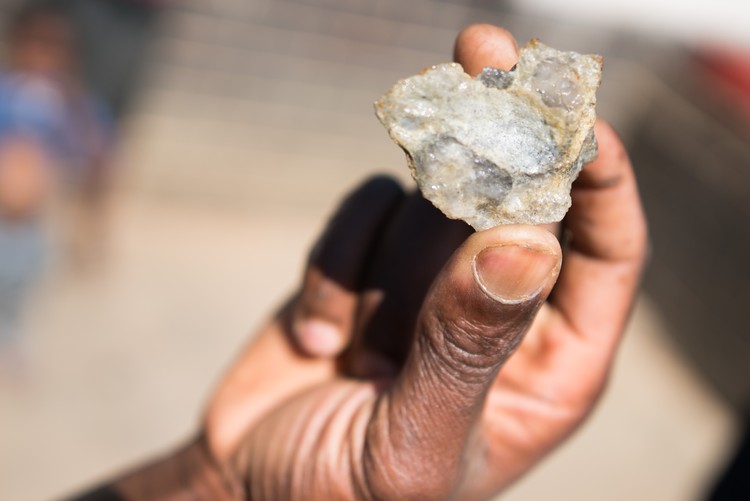
An informal miner holds up a piece of rock containing flecks of gold.
11 January 2018
On a clear, sunny morning in Durban Deep, a defunct gold mine on Johannesburg’s Witwatersrand gold reef, a group of five Zimbabwean informal miners, known as zama zamas, prepare to go underground. They test their torches, adjust their knee pads, pull balaclavas over their heads and pack meagre rations of white bread and biscuits into dust-covered backpacks.
Freedom*, a softly-spoken 24-year-old originally from Harare, has been working in Durban Deep’s labyrinthine network of abandoned mineshafts for about a year. Without a South African work permit, he’s unable to get formal employment. He says he and his colleagues will sometimes spend a week at a time underground, descending as far as 40 metres below the rocky surface.
“My first experience was very difficult. I was very scared,” Freedom recalls. “Even now, it’s still a pretty frightening feeling being down there. There are a lot of cracks in the rock. You could easily die down there.”
According to a 2015 report by the South African Human Rights Commission (SAHRC), there are approximately 30,000 illegal miners operating across South Africa. An estimated 350 of these miners work in the West Wits area, which incorporates Durban Deep and the neighbouring township of Sol Plaatje.
The report goes on to say that the rapid and ongoing rise of zama zamas, a term that loosely translates from isiZulu as “take a chance”, is a reflection of the widespread decline in South Africa’s formal mining industry as well as the political and economic instability of neighbouring countries. The SAHRC estimates that 80% of zama zamas in South Africa are undocumented immigrants like Freedom.
Deputy Mineral Resources Minister Godfrey Oliphant has said that about 10% of South Africa’s gold production, worth about R7-billion, is taken out of the country each year through illicit mining, much of it from here in Gauteng.
Durban Deep, formerly nicknamed the Grand Old Lady in mining circles, formally ceased its operations in 2001. But growing competition for the 12-million ounces of gold still believed to be unmined in the area has sparked a deadly turf war in which illegal miners have been murdered by rival gangs and syndicates on an almost weekly basis.
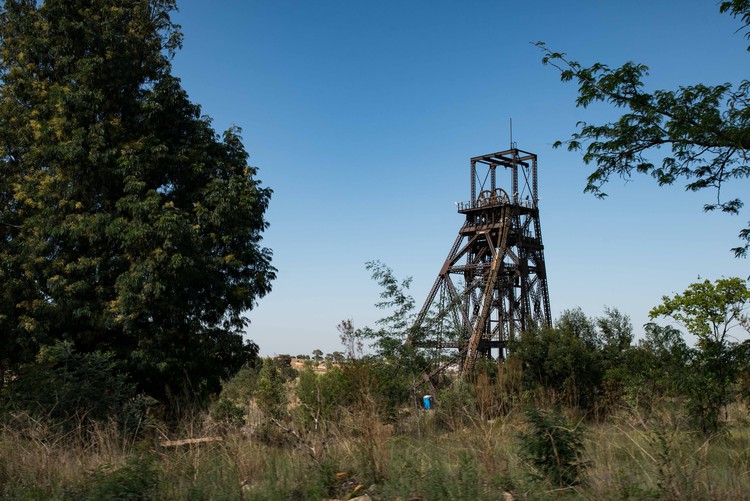
According to Brigadier Sam Manala, station commander at Roodepoort Police Station, approximately 90% of murders in his precinct, which includes Durban Deep, are related to illegal mining. “This is one of the biggest problems that we are facing in this area,” Manala told GroundUp. 88 murders were recorded in Roodepoort precinct in 2017.
“Within the last year, there have been so many dead bodies around here,” 50-year-old resident Fani Magwaza confirms. “Just in the past few weeks, I can’t tell you how many people have been shot. At night, all you hear is gunshots.”
Magwaza, who moved to Durban Deep in 2002, lives in a whitewashed Victorian bungalow with chipped walls and a rusting corrugated zinc roof on a leafy street lined with similar properties. These homes were once inhabited by the mine’s white employees. Today, they have fallen into a state of disrepair. The low income residents who moved in when the mine closed have been without electricity or running water since 2014, when municipal services to Durban Deep were discontinued.
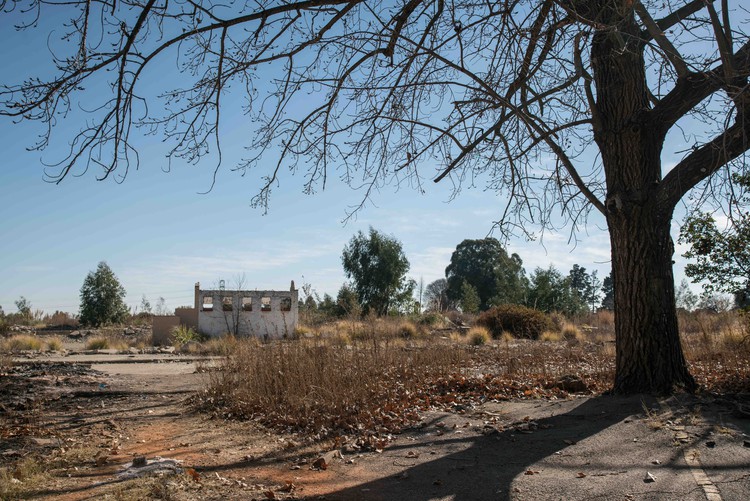
Magwaza, a former mine worker, is unemployed like most of Durban Deep’s 800 or so residents. But he gains a basic income by charging a couple of rands for games of pool on a well-worn table on his front stoep; he also runs an informal tuck shop and occasionally leases rooms in his home to zama zamas. “Maybe 75 or 85% of people here are living from the zama zamas,” Magwaza says.
According to Cora Bailey, who founded an animal welfare clinic in Durban Deep 15 years ago, the proliferation of informal mining in the area and the violence and lawlessness increasingly associated with it have been encouraged by years of gross neglect. “Durban Deep is like a forgotten community where nobody feels obliged to do any law enforcement whatsoever and no crimes are ever solved,” she says.
This void has led some of Durban Deep’s desperate residents to take justice into their own hands, lynching those they suspect of terrorising their traumatised community.
In November, Bailey had to intervene to stop an angry crowd from necklacing a suspected criminal. “I was there for two hours negotiating with people. I knew that if I left there at any time, they would kill him,” she says, adding that she has lost count of the number of times she’s witnessed such incidents.
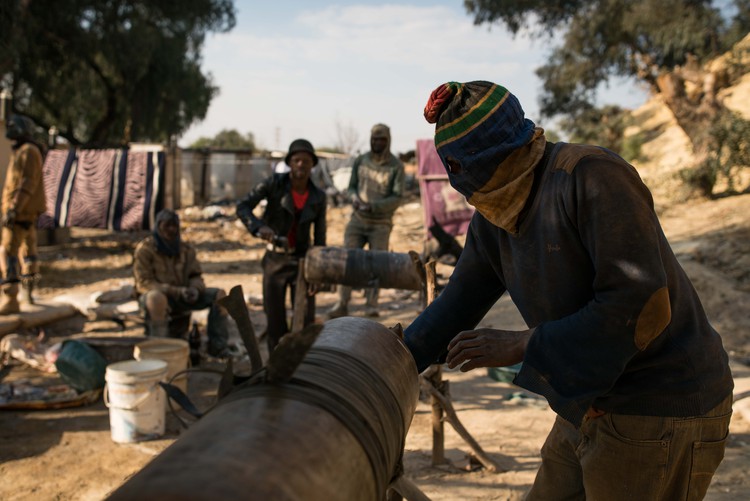
Magwaza told GroundUp that an informal community security outfit has also sprung up in Durban Deep in the past few months, with groups of young men offering “protection” to residents and to zama zamas in return for a weekly fee of R170. “If you don’t pay, they’ll attack you,” he says. “I’m not working, so maybe one day I can’t pay. I’m afraid of what they can do to me then.”
Magwaza has little faith in the police’s ability to protect local residents from escalating violence, echoing a commonly held sentiment in Durban Deep that SAPS is in fact complicit in the illegal mining industry. “Sometimes the station commander will arrange a sting operation, but then the cops will tip off the miners and the buyers because they are profiting too much from this business. The cops come around here taking money each and every day,” Magwaza says.
Brigadier Manala told GroundUp that he “cannot deny that there are some police officers that are corrupt, but our crime intelligence is working on that and we will deal with that accordingly. But making allegations without proof is not going to help us.”
Hawks spokesperson Brigadier Hangwani Mulaudzi said they were undertaking “an ongoing series of investigations” into “illegal mining” across South Africa, including alleged widespread police involvement in the industry. “There are always allegations of police corruption, which we do act upon, but no SAPS members have been arrested so far,” Mulaudzi said.
Close to Magwaza’s bungalow, a line of expensive cars is parked next to neatly-stacked piles of mielie meal bags containing the zama zama’s quarry for sale. A police vehicle crawls slowly past this makeshift marketplace and then drives on without stopping. Buyers from across Johannesburg load bags into the boots of their cars and head back towards the city.
David van Wyk, a mining researcher with the Johannesburg-based Bench Marks Foundation, says that these buyers are largely responsible for the escalating violence associated with informal mining.
“The syndicates that buy the gold try to force a price on the guys that dig it out. Then when there’s a dispute, violence breaks out,” van Wyk says. “Or it’s competing syndicates trying to control groups of zama zamas that are operational in specific areas. Basically, there’s a parasitical group of people who are exploiting the zama zamas, who consequently get very low prices for the gold.”
Blessing*, 31, sits on an upturned paint bucket outside his shack in Sol Plaatje. He came to South Africa from Zimbabwe in 2006 and began illegally mining in the Durban Deep area in 2012. In a good month, he says he can make R2,000 for his efforts.
In March 2017, Blessing was shot in the leg by a group of men who robbed him of his bags of gold-flecked sand when he came up from a few days underground. The assailants also shot dead one of his companions. Due to the enduring pain in his leg, Blessing has been unable to work since.
But despite the risks, as soon as his leg allows, Blessing says he’ll go back underground. “Things are difficult. I have a child,” he says, motioning towards a three-year-old girl playing on the street behind him. “My wife is only working every now and again. So since I got injured sometimes we’ve gone two or three months without even being able to pay R500 for the rent. Sometimes we go hungry. Even though I am scared to go underground again, even though it’s not safe, I don’t have a choice.”
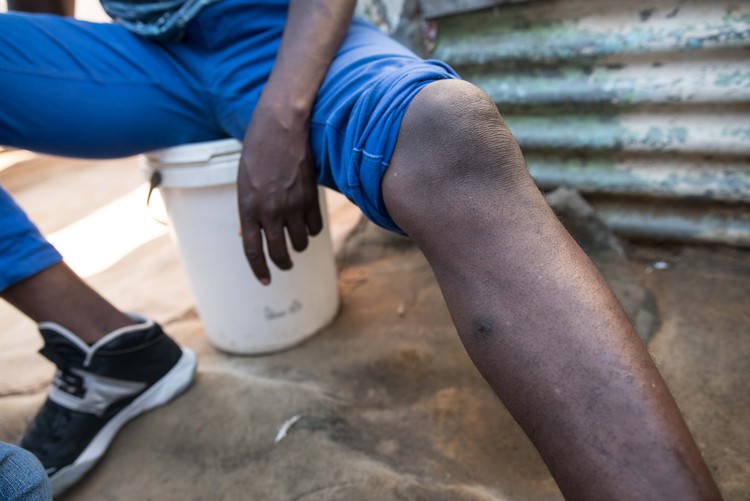
But Blessing and other zama zamas working in Durban Deep may soon have to look further afield for economic opportunity. In 2014, sections of the original Durban Deep mining village, including two dilapidated hostels, were sold to Johannesburg developer Dino Properties, which plans to build approximately 15,000 affordable housing units as part of a broader provincial project intended to help mitigate Gauteng’s 800,000 housing unit shortage.
In a joint venture with Dino Properties, Australian mining company West Wits Mining has been awarded a licence by the Department of Mineral Resources to resuscitate Durban Deep mine, claiming in 2016 that this will both improve security in the area and create up to 2,500 jobs. Neither West Wits nor the Department of Mineral Resources could be reached for further comment for this story.
According to Bailey, Durban Deep residents remain sceptical about what these developments will mean for them, fearing that sooner or later they will be forcefully evicted. For all the trials and tribulations of life in Durban Deep, most residents have nowhere else to go.
* Names have been changed